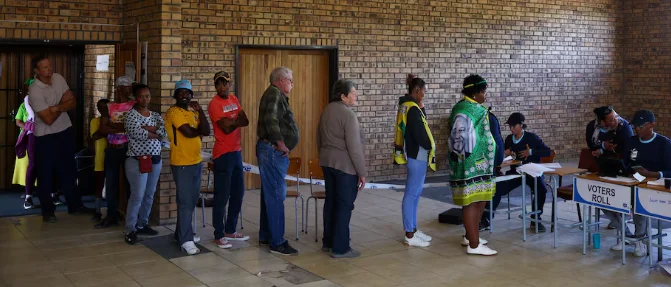
Voters line up at a polling station in Hopetown, located in the Northern Cape province of South Africa, during the national elections on May 29, 2024.
In Summary:
- High voter turnout observed, surpassing 2019 levels
- Reports of minor disruptions at some polling stations
- Major parties remain optimistic amid competitive atmosphere
In what is shaping up to be the most competitive election since the end of apartheid, South Africans are turning out in record numbers.
Early indications suggest that voter turnout could exceed the 66% seen in 2019, reflecting widespread frustration with the status quo.
From the bustling streets of Johannesburg and Cape Town to the rural heartlands and townships, citizens braved the morning cold to cast their ballots.
Bongile Mkunqa, 53, an unemployed resident of Langa, Cape Town’s oldest Black township, voiced a common sentiment: “It is a long time the ANC is in charge in the country, but it didn’t change.”
The African National Congress (ANC), in power since Nelson Mandela’s historic 1994 victory, faces unprecedented challenges.
High unemployment, rampant crime, frequent power blackouts, and allegations of corruption have driven many voters toward opposition parties.
Nonetheless, some, like 62-year-old pensioner Charles Louw, remain loyal to the ANC, valuing its experience over the uncertain promises of newer parties.
President Cyril Ramaphosa, casting his vote in Soweto, expressed confidence in the ANC’s campaign.
“I have no doubt whatsoever in my heart of hearts that the people will invest their confidence in the African National Congress,” he stated.
John Steenhuisen, leader of the Democratic Alliance (DA), which secured the second-largest share of votes in 2019, highlighted the stakes of this election after voting in Durban.
“This is the most consequential election since 1994,” he declared, urging South Africans to vote for change.
Meanwhile, Julius Malema, leader of the Economic Freedom Fighters (EFF), reiterated his ambition to unseat the ANC.
Voting in Seshego, Limpopo, Malema proclaimed, “We are in an election to remove the ANC. We are here to take over government.”
Adding to the election’s complexity is former president Jacob Zuma, who now supports the uMkhonto we Sizwe (MK) party, named after the ANC’s former armed wing. Zuma’s backing could influence outcomes, especially in his home province of KwaZulu-Natal.
Despite the high turnout and competitive atmosphere, the voting process has been largely smooth.
According to the electoral commission, 93% of polling stations opened on time. However, there were isolated disruptions, such as delays in Alexandra due to late ballot paper deliveries and voters being turned away in Johannesburg for not being registered at the polling station.
More than 27 million South Africans are registered to vote at over 23,000 polling stations, with voting continuing until 9 p.m. (1900 GMT).
The electoral commission is expected to start releasing partial results shortly after the polls close, with final results anticipated within a few days.
As the nation awaits the outcome, this election marks a pivotal moment in South Africa’s democratic journey, with the potential for significant political realignment on the horizon.
